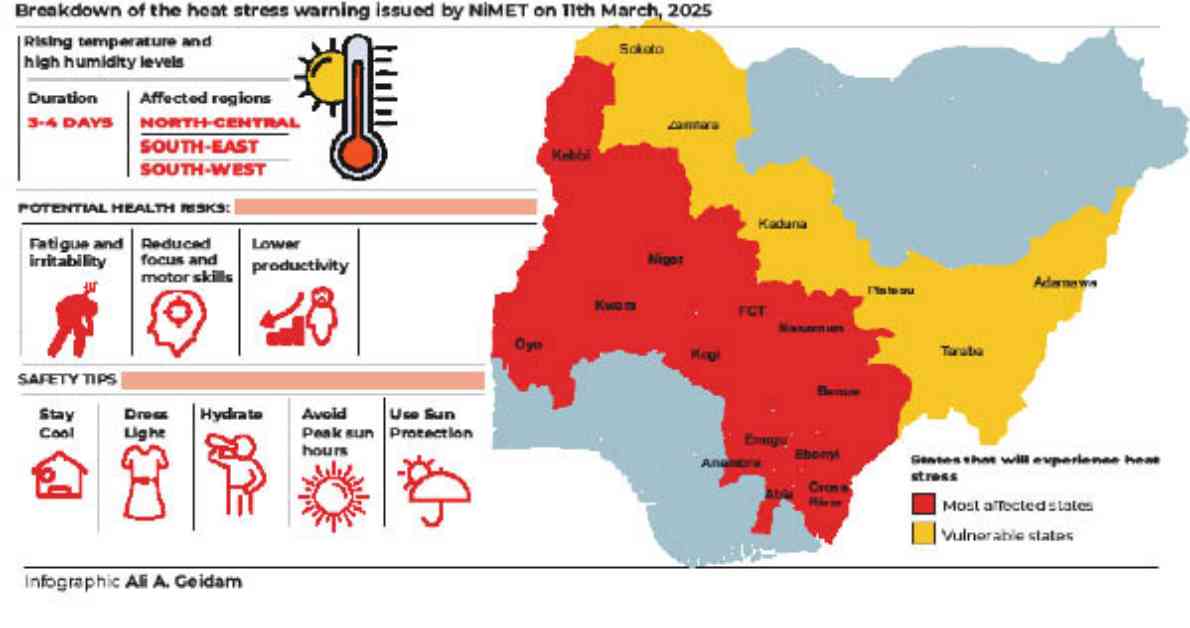The ongoing heat wave across the country has been causing severe impacts on the population, especially vulnerable groups like pregnant women and children, who struggle to cope with the harsh conditions. The rising temperatures have led to an increase in heat-related illnesses among children in various regions, while pregnant women face challenges of dehydration and intense heat, exacerbated by the fasting period during Ramadan.
**Challenges Faced by Pregnant Women and Children**
In a heart-wrenching account from Yola, Adamawa State, Hajiya Hajara Audu shared her tragic experience of losing her one-month pregnancy due to the extreme heat. “I went to work and felt the heat penetrating deep into my bones. Before I could rush to the hospital, I started bleeding; and that’s how I lost my pregnancy,” she narrated, highlighting the devastating impact of the heat wave on vulnerable individuals.
Residents across multiple states have been grappling with the scorching heat, affecting their health, livelihoods, and daily activities. Experts have emphasized the health implications of heat stress, urging the public to take necessary measures to stay healthy and hydrated, particularly during Ramadan when fasting limits water intake.
**Expert Warnings and Regional Impact**
The Nigerian Meteorological Agency (NiMet) issued an advisory warning about the heat stress in the country, predicting rising temperatures and high humidity levels that could cause thermal discomfort in several regions. Areas most affected include Kebbi, Niger, Kwara, Oyo, Kogi, Nasarawa, Anambra, Abia, Ebonyi, Cross River, and the Federal Capital Territory (FCT), among others.
In response to the intense heat, residents in various states have been devising strategies to mitigate its effects. In Kano, individuals have resorted to using rechargeable fans to combat the soaring temperatures, with some even sleeping outdoors to escape the heat. Ice block sellers in local markets have seen increased patronage as people seek to keep their drinks cold during the fasting period.
**Local Adaptations and Health Precautions**
In Taraba, despite the heat wave, traders, mechanics, and bricklayers continue to conduct their businesses under the sun, showcasing resilience in the face of challenging conditions. Children have been particularly vulnerable in Ebonyi, with cases of heat rashes reported due to the soaring temperatures, prompting residents to increase water consumption and adopt cooling measures.
NiMet’s heat stress alert highlighted Kebbi as one of the worst-affected states, with residents enduring intense heat and irregular power supply. A proactive resident from Birnin Kebbi shared how the scorching heat forced them to sleep outdoors due to the unbearable conditions, emphasizing the need for preventive measures.
**Expert Recommendations and Public Health Measures**
Medical professionals have advised residents to avoid prolonged exposure to the sun, stay hydrated, and maintain a cool environment to prevent heat-related illnesses. Experts have underscored the importance of drinking plenty of water, avoiding overcrowded rooms, and seeking medical attention if symptoms of heat exhaustion or dehydration arise.
NiMet has recommended protective measures such as using cooling devices, wearing appropriate clothing, limiting sun exposure, and staying informed about heat stress prevention. By following these guidelines and taking necessary precautions, individuals can safeguard their health and well-being during the challenging period of the heat wave.
In conclusion, the heat wave presents significant challenges for communities across the country, underscoring the importance of collective action to mitigate its impact and protect vulnerable populations. By heeding expert advice, staying informed, and implementing practical measures, individuals can navigate the heat wave safely and sustain their well-being in the face of extreme weather conditions.















